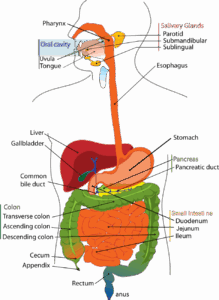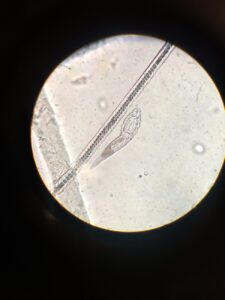Lately, more people are told to get a colonoscopy to test for cancer. Not only do colorectal screening tests present a high false positive rate, which ends up being expensive, and causing unnecessary stress, but these screens, and the prescribers, overlook the cause of the polyps.
The Tests
 Over decades, people have come to dread the colonoscopy exam, and the latest Cologard test, both promoted to test for cancer. Unfortunately, both tests have high false positive results. Even with the potential for over-treatment, doctors still promote colon tests for anyone age 45 years or older.
Over decades, people have come to dread the colonoscopy exam, and the latest Cologard test, both promoted to test for cancer. Unfortunately, both tests have high false positive results. Even with the potential for over-treatment, doctors still promote colon tests for anyone age 45 years or older.
The medical solution is to start with the inexpensive, non-invasive Cologard test in the privacy of your own home, then follow up with colonoscopy. According to The Medical Advisory Board:
Given these considerations, patients with a positive Cologuard result should undergo follow-up colonoscopy to confirm the presence of cancer or polyps, and those at average risk for colorectal cancer should discuss appropriate screening intervals with their healthcare provider.
Thanks to Telehealth, the latest, simple blood test, claims to give an answer in the convenience of your home, by text. No doctor necessary.
Those who choose to undergo a colonoscopy, or endoscopy, under anesthesia, simply have all polyps cut out. Case closed. But there are dangers that are often not disclosed.
The Undisclosed Cause
 Medical studies, going back to 1990 have suggested that polyps are nothing less than parasite infections. In fact, many studies suggest colonic polyps are the result of Schistosomiasis infection; Parasites.
Medical studies, going back to 1990 have suggested that polyps are nothing less than parasite infections. In fact, many studies suggest colonic polyps are the result of Schistosomiasis infection; Parasites.
So why have medical doctors ignored their own science showing infectious polyps?
Many doctors consider Schistosoma-induced colonic polyps different from other colonic polyps, buy fail to investigate all possible causes (i.e., parasites). In 1996, one study said:
Most cases of hepatosplenic schistosomiasis resolve after effective treatment.
But there is never an effective treatment to resolve the problem because parasitic treatment does not follow colonoscopy. If “cancer” is diagnosed, then the usual, cut-it out, burn-it out, or irradiate-it, cancer treatments follow, sometimes with new IV infusions.
Misdiagnosis
The elephant in the surgical room is misdiagnosis. According to a 2010 study of 46 cases of endoscopy:
Of the 12 misdiagnosed patients, 4 were misdiagnosed as ulcerative colitis, 1 as Crohn’s disease, and 7 as ischemic colitis…Eight out of the 46 patients were diagnosed as colonic carcinoma…Eight out of the 46 patients were diagnosed as colonic carcinoma.
It is now common knowledge (except in western medicine) that cancer is an expression of parasitic infection and yeast/fungal overgrowth. This is especially true with all the attention paid to the pharmaceutical drug, Fenbendozole, in human and animal cancer research, organizations, experimental protocols, and support groups.
However, before embarking on a Fenbendozole binge, realize that, as a pharmaceutical drug, Fenbendozole comes with direct effects that include liver toxicity. That also applies to Ivermectin, another popular anti-parasitic drug.
Nip it in the Bud
Without belaboring the point, when it comes to polyps and parasites, the obvious solution is to seek a practitioner who will test for parasites and save the cost and agony of over-treatment. Both parasites/eggs. and yeast/fungus/mold (perhaps biofilms and other pathogens) must be addressed for full healing.
Otherwise, people are treating symptoms without addressing the cause.
For the true cause, one must ask the question, why are parasites there in the first place?
Related articles:
*The author does not recommend any therapy or protocol suggested in this article without the advice of a professional. For medical problems, seek medical attention. For anything else, seek the guidance of a knowledgable practitioner.








“HHS Builds $37.5M Bird Flu Pandemic Hospital Network—75 Facilities to Serve as Federal ‘Special Pathogen’ Centers
Internal NETEC document confirms H5N1 avian influenza preparedness at the core mission of new taxpayer funded hospital network.”
JON FLEETWOOD
OCT 31
Omg. Great, Reporting